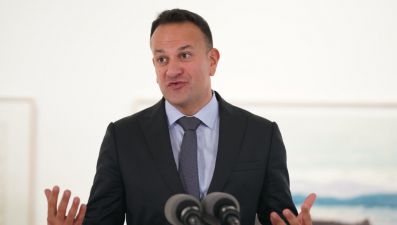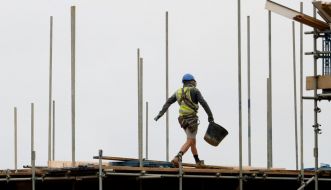The euro zone eked out growth in the final three months of 2022, avoiding a recession even as sky-high energy costs, waning confidence and rising interest rates took a toll on the currency bloc's economy, new data from Eurostat shows.
Gross domestic product (GDP) in the euro zone expanded by 0.1 per cent in the fourth quarter, outperforming expectations in a Reuters poll for a 0.1 per cent drop. Compared to a year earlier, growth was 1.9 per cent, above expectations of 1.8 per cent.
The Irish economy grew by a better-than-expected 12.2 per cent last year despite a severe cost-of-living squeeze and a significant slowdown in the global economy.
This was significantly ahead of Government forecasts and made Ireland the fastest growing economy in Europe once again.
The figures show GDP, the standard measure of growth, grew by an estimated 3.5 per cent in Ireland in the final three months of last year compared with the previous quarter.
Among the bloc's biggest countries, Germany and Italy recorded negative growth rates for the quarter but France and Spain expanded, Eurostat added, based on a flash estimate that is subject to revisions.
Multinationals
GDP growth figures for Ireland are skewed by the outsized role that multinational firms play in the economy, particularly in the pharmaceutical sector, which have continued to trade strongly despite the deteriorating international outlook.
Russia's nearly year-old war in Ukraine has proved costly for the euro zone, which now spans 350 million people in 20 countries, given some members' heavy reliance on cheap energy.
Surging oil and gas prices have depleted savings and held back investment while forcing the European Central Bank into unprecedented rate hikes to arrest inflation.
But the economy has displayed some unexpected resilience, too, much like during the Covid-19 pandemic, when growth outperformed expectations as businesses adjusted faster to changed circumstances than policymakers had predicted.
More recent figures like a crucial confidence indicator or the latest PMI data suggest that growth has hit bottom already and a slow recovery is underway, helped by a mild winter that has limited energy spending.
With market based energy prices hovering at pre-war levels, the International Monetary Fund upgraded its growth projection for the bloc on Monday, citing unexpected resilience, helped by generous government support.

The IMF now sees growth at 0.7 per cent for the full year, above its 0.5 per cent forecast of October and the 0.5 per cent predicted by the European Central Bank in December.
But even if the bloc is doing better than feared, growth in 2023 will be among the weakest on record due to a large drop in real incomes and surging interest rates.
The ECB has raised rates by a combined 2.5 percentage points to 2 per cent since July to tame inflation, and markets see another 1.5 percentage points of increases by mid-year, which would put the deposit rate at its highest level since the turn of the century.
Such a rapid increase is putting a brake on bank lending, a key source of credit for businesses, and access to loans has already suffered the biggest drop last quarter since the bloc's 2011 debt crisis.







